International Business Economics and Markets Analysis Report
VerifiedAdded on 2022/09/08
|15
|3423
|19
Report
AI Summary
This report delves into the multifaceted world of international business, commencing with an exploration of international trade, encompassing its definition, significance, and the impact of globalization. It then examines free trade and trade restrictions, providing insights into the UK's economic cooperation and preferential trade arrangements. The report proceeds to analyze market entry strategies, including market selection and various entry modes such as exporting, joint ventures, and foreign direct investments. Furthermore, it elucidates the elements of the marketing mix, emphasizing its importance in the context of the FMCG and luxury goods sectors. The latter part of the report shifts its focus to international trading blocs, intergovernmental bodies, and international markets, discussing their influence on global trade. It also addresses international institutions, such as the IMF and World Bank, and concludes with a discussion on foreign currency exchange. The report incorporates examples like Unilever's global expansion to illustrate key concepts.

Paraphrase This Document
Need a fresh take? Get an instant paraphrase of this document with our AI Paraphraser
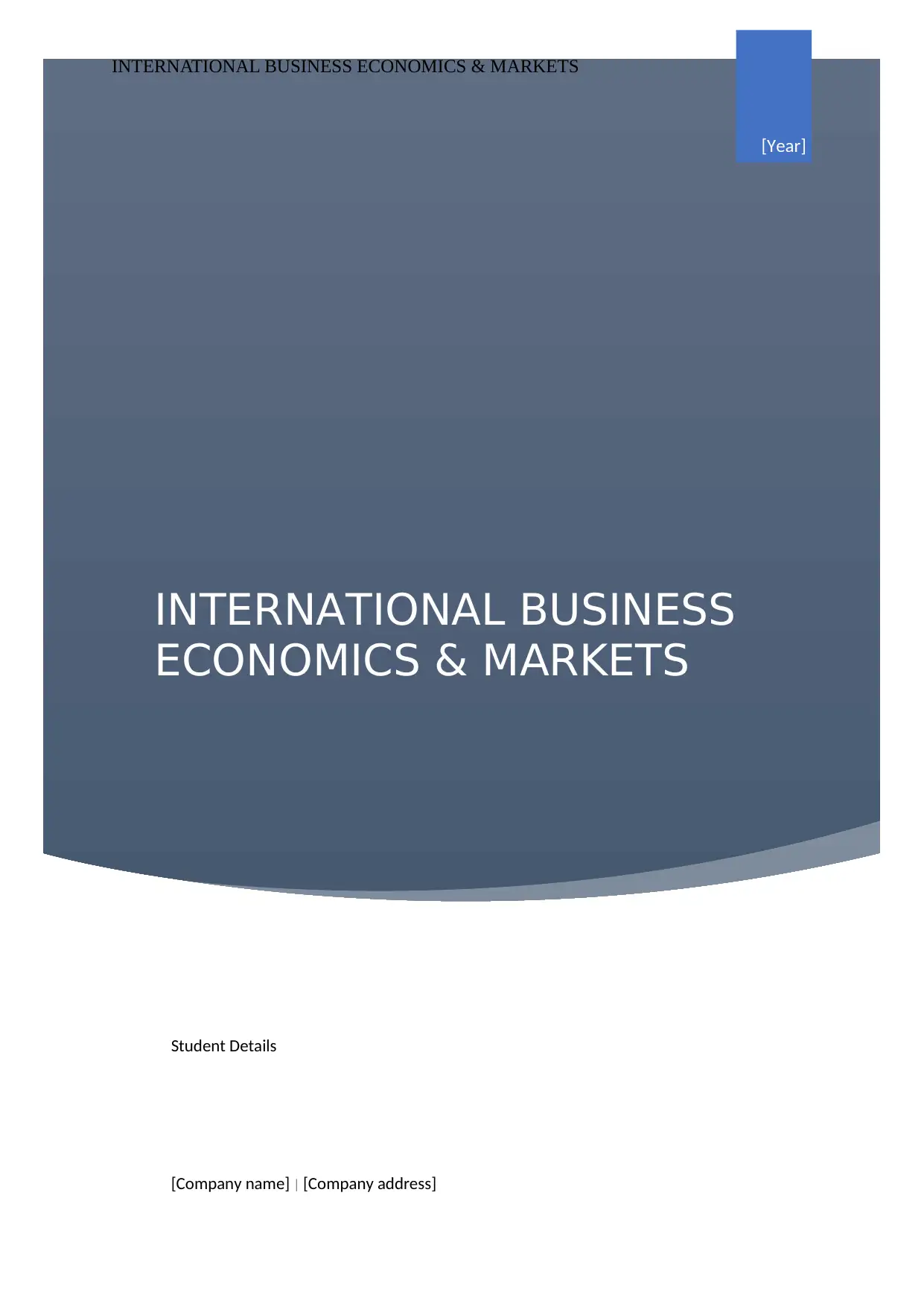
INTERNATIONAL BUSINESS
ECONOMICS & MARKETS
INTERNATIONAL BUSINESS ECONOMICS & MARKETS 1 | P a g e
[Year]
Student Details
[Company name] | [Company address]
ECONOMICS & MARKETS
INTERNATIONAL BUSINESS ECONOMICS & MARKETS 1 | P a g e
[Year]
Student Details
[Company name] | [Company address]
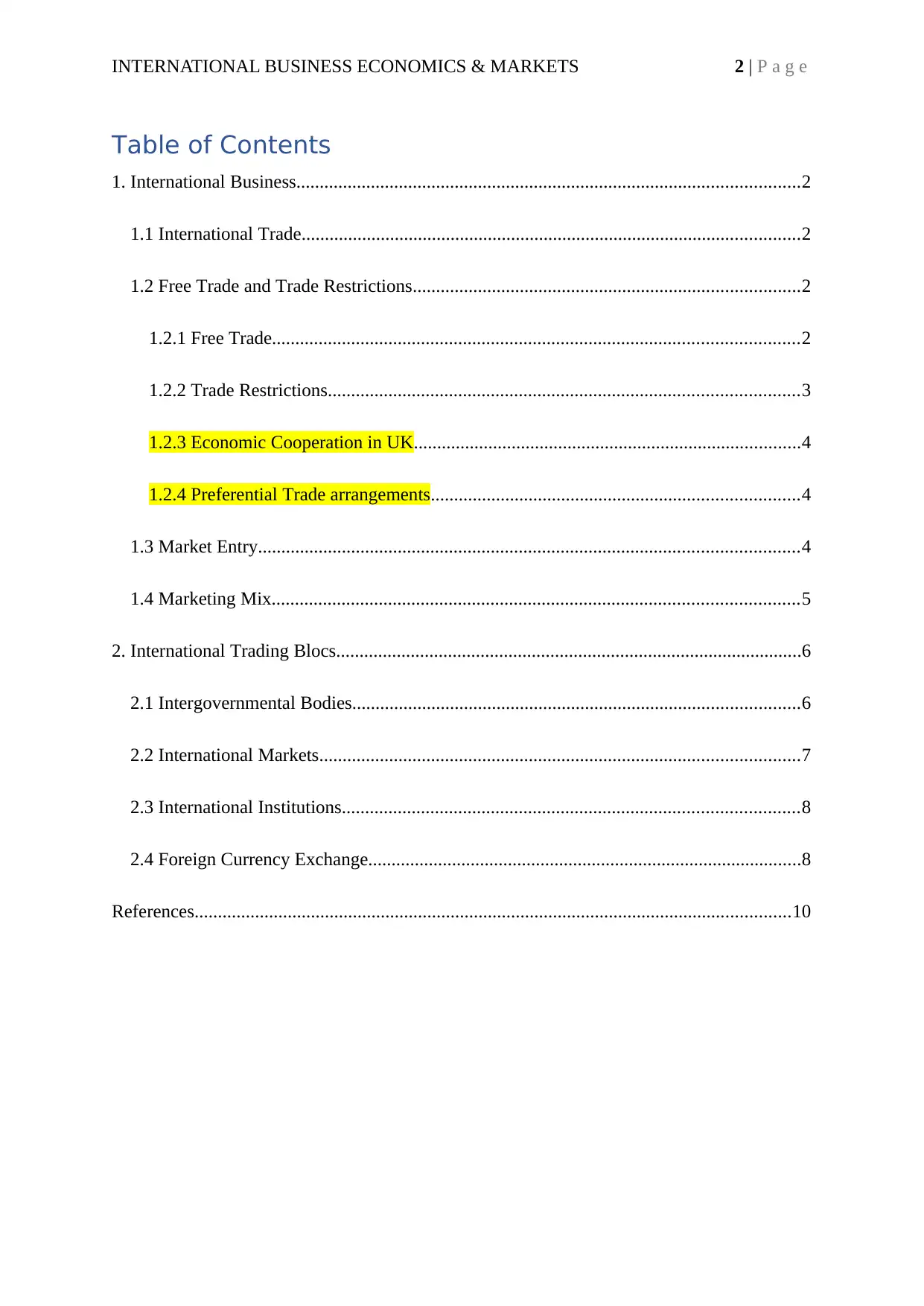
INTERNATIONAL BUSINESS ECONOMICS & MARKETS 2 | P a g e
Table of Contents
1. International Business............................................................................................................2
1.1 International Trade...........................................................................................................2
1.2 Free Trade and Trade Restrictions...................................................................................2
1.2.1 Free Trade.................................................................................................................2
1.2.2 Trade Restrictions.....................................................................................................3
1.2.3 Economic Cooperation in UK...................................................................................4
1.2.4 Preferential Trade arrangements...............................................................................4
1.3 Market Entry....................................................................................................................4
1.4 Marketing Mix.................................................................................................................5
2. International Trading Blocs....................................................................................................6
2.1 Intergovernmental Bodies................................................................................................6
2.2 International Markets.......................................................................................................7
2.3 International Institutions..................................................................................................8
2.4 Foreign Currency Exchange.............................................................................................8
References................................................................................................................................10
Table of Contents
1. International Business............................................................................................................2
1.1 International Trade...........................................................................................................2
1.2 Free Trade and Trade Restrictions...................................................................................2
1.2.1 Free Trade.................................................................................................................2
1.2.2 Trade Restrictions.....................................................................................................3
1.2.3 Economic Cooperation in UK...................................................................................4
1.2.4 Preferential Trade arrangements...............................................................................4
1.3 Market Entry....................................................................................................................4
1.4 Marketing Mix.................................................................................................................5
2. International Trading Blocs....................................................................................................6
2.1 Intergovernmental Bodies................................................................................................6
2.2 International Markets.......................................................................................................7
2.3 International Institutions..................................................................................................8
2.4 Foreign Currency Exchange.............................................................................................8
References................................................................................................................................10
⊘ This is a preview!⊘
Do you want full access?
Subscribe today to unlock all pages.

Trusted by 1+ million students worldwide
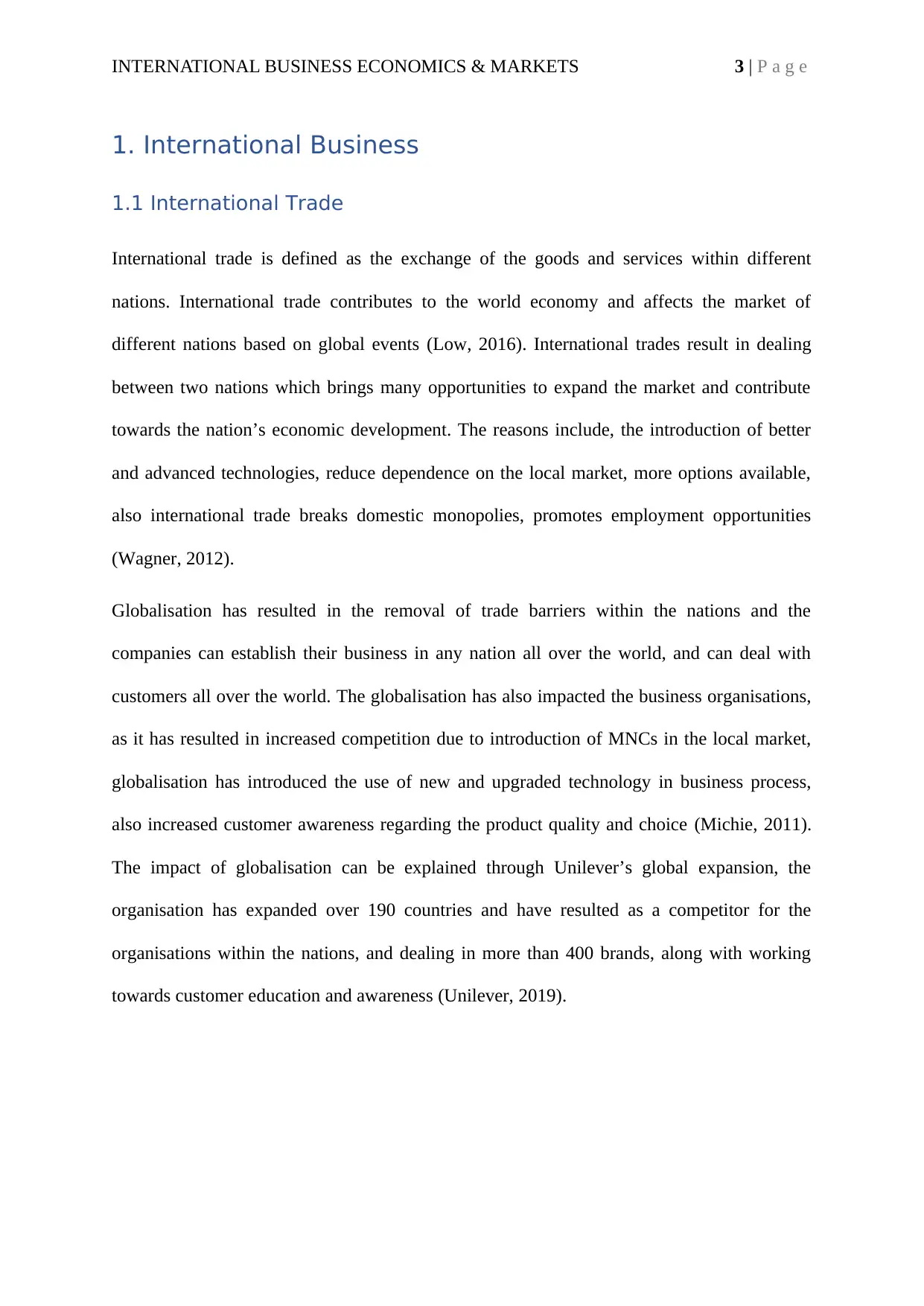
INTERNATIONAL BUSINESS ECONOMICS & MARKETS 3 | P a g e
1. International Business
1.1 International Trade
International trade is defined as the exchange of the goods and services within different
nations. International trade contributes to the world economy and affects the market of
different nations based on global events (Low, 2016). International trades result in dealing
between two nations which brings many opportunities to expand the market and contribute
towards the nation’s economic development. The reasons include, the introduction of better
and advanced technologies, reduce dependence on the local market, more options available,
also international trade breaks domestic monopolies, promotes employment opportunities
(Wagner, 2012).
Globalisation has resulted in the removal of trade barriers within the nations and the
companies can establish their business in any nation all over the world, and can deal with
customers all over the world. The globalisation has also impacted the business organisations,
as it has resulted in increased competition due to introduction of MNCs in the local market,
globalisation has introduced the use of new and upgraded technology in business process,
also increased customer awareness regarding the product quality and choice (Michie, 2011).
The impact of globalisation can be explained through Unilever’s global expansion, the
organisation has expanded over 190 countries and have resulted as a competitor for the
organisations within the nations, and dealing in more than 400 brands, along with working
towards customer education and awareness (Unilever, 2019).
1. International Business
1.1 International Trade
International trade is defined as the exchange of the goods and services within different
nations. International trade contributes to the world economy and affects the market of
different nations based on global events (Low, 2016). International trades result in dealing
between two nations which brings many opportunities to expand the market and contribute
towards the nation’s economic development. The reasons include, the introduction of better
and advanced technologies, reduce dependence on the local market, more options available,
also international trade breaks domestic monopolies, promotes employment opportunities
(Wagner, 2012).
Globalisation has resulted in the removal of trade barriers within the nations and the
companies can establish their business in any nation all over the world, and can deal with
customers all over the world. The globalisation has also impacted the business organisations,
as it has resulted in increased competition due to introduction of MNCs in the local market,
globalisation has introduced the use of new and upgraded technology in business process,
also increased customer awareness regarding the product quality and choice (Michie, 2011).
The impact of globalisation can be explained through Unilever’s global expansion, the
organisation has expanded over 190 countries and have resulted as a competitor for the
organisations within the nations, and dealing in more than 400 brands, along with working
towards customer education and awareness (Unilever, 2019).
Paraphrase This Document
Need a fresh take? Get an instant paraphrase of this document with our AI Paraphraser
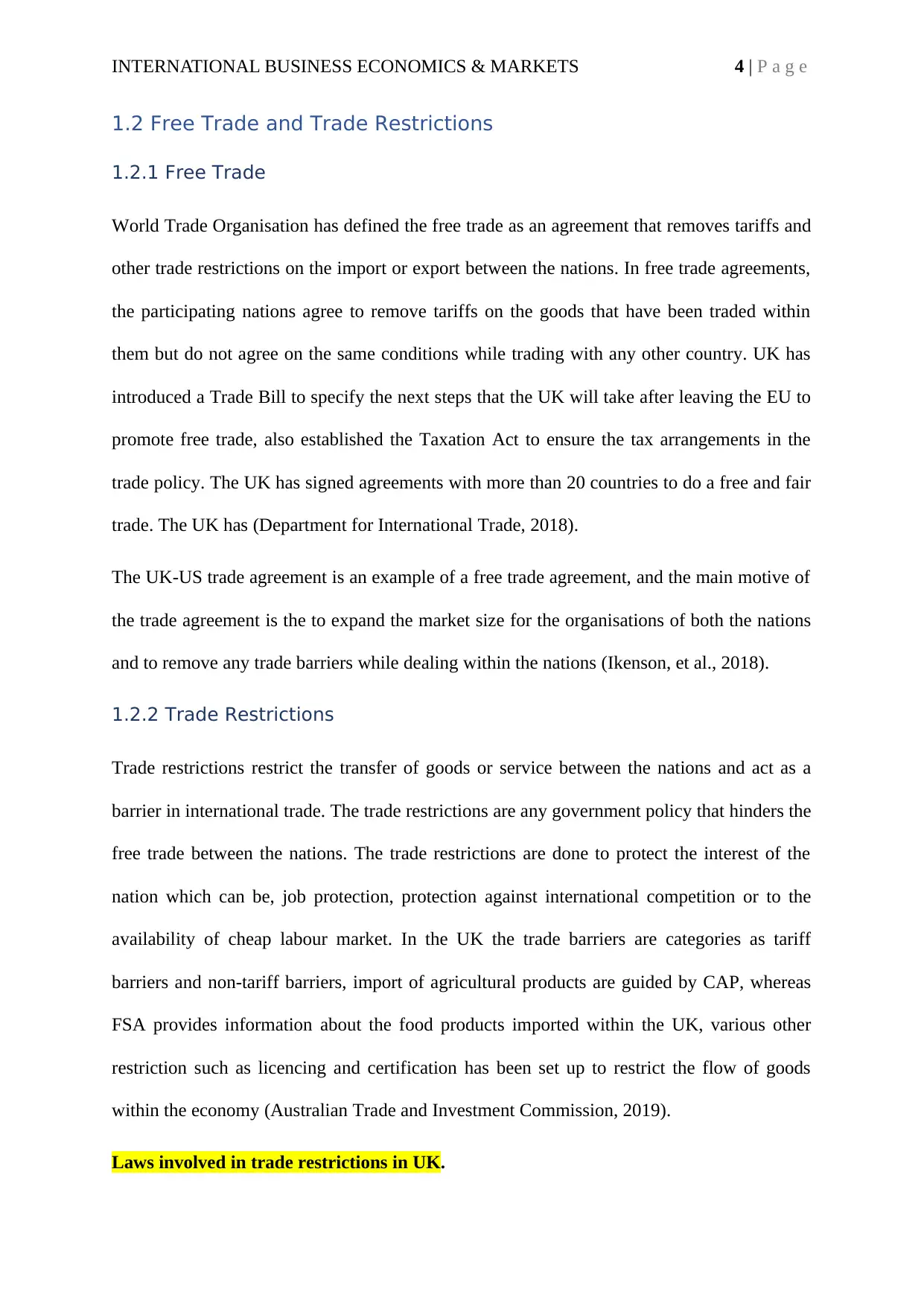
INTERNATIONAL BUSINESS ECONOMICS & MARKETS 4 | P a g e
1.2 Free Trade and Trade Restrictions
1.2.1 Free Trade
World Trade Organisation has defined the free trade as an agreement that removes tariffs and
other trade restrictions on the import or export between the nations. In free trade agreements,
the participating nations agree to remove tariffs on the goods that have been traded within
them but do not agree on the same conditions while trading with any other country. UK has
introduced a Trade Bill to specify the next steps that the UK will take after leaving the EU to
promote free trade, also established the Taxation Act to ensure the tax arrangements in the
trade policy. The UK has signed agreements with more than 20 countries to do a free and fair
trade. The UK has (Department for International Trade, 2018).
The UK-US trade agreement is an example of a free trade agreement, and the main motive of
the trade agreement is the to expand the market size for the organisations of both the nations
and to remove any trade barriers while dealing within the nations (Ikenson, et al., 2018).
1.2.2 Trade Restrictions
Trade restrictions restrict the transfer of goods or service between the nations and act as a
barrier in international trade. The trade restrictions are any government policy that hinders the
free trade between the nations. The trade restrictions are done to protect the interest of the
nation which can be, job protection, protection against international competition or to the
availability of cheap labour market. In the UK the trade barriers are categories as tariff
barriers and non-tariff barriers, import of agricultural products are guided by CAP, whereas
FSA provides information about the food products imported within the UK, various other
restriction such as licencing and certification has been set up to restrict the flow of goods
within the economy (Australian Trade and Investment Commission, 2019).
Laws involved in trade restrictions in UK.
1.2 Free Trade and Trade Restrictions
1.2.1 Free Trade
World Trade Organisation has defined the free trade as an agreement that removes tariffs and
other trade restrictions on the import or export between the nations. In free trade agreements,
the participating nations agree to remove tariffs on the goods that have been traded within
them but do not agree on the same conditions while trading with any other country. UK has
introduced a Trade Bill to specify the next steps that the UK will take after leaving the EU to
promote free trade, also established the Taxation Act to ensure the tax arrangements in the
trade policy. The UK has signed agreements with more than 20 countries to do a free and fair
trade. The UK has (Department for International Trade, 2018).
The UK-US trade agreement is an example of a free trade agreement, and the main motive of
the trade agreement is the to expand the market size for the organisations of both the nations
and to remove any trade barriers while dealing within the nations (Ikenson, et al., 2018).
1.2.2 Trade Restrictions
Trade restrictions restrict the transfer of goods or service between the nations and act as a
barrier in international trade. The trade restrictions are any government policy that hinders the
free trade between the nations. The trade restrictions are done to protect the interest of the
nation which can be, job protection, protection against international competition or to the
availability of cheap labour market. In the UK the trade barriers are categories as tariff
barriers and non-tariff barriers, import of agricultural products are guided by CAP, whereas
FSA provides information about the food products imported within the UK, various other
restriction such as licencing and certification has been set up to restrict the flow of goods
within the economy (Australian Trade and Investment Commission, 2019).
Laws involved in trade restrictions in UK.
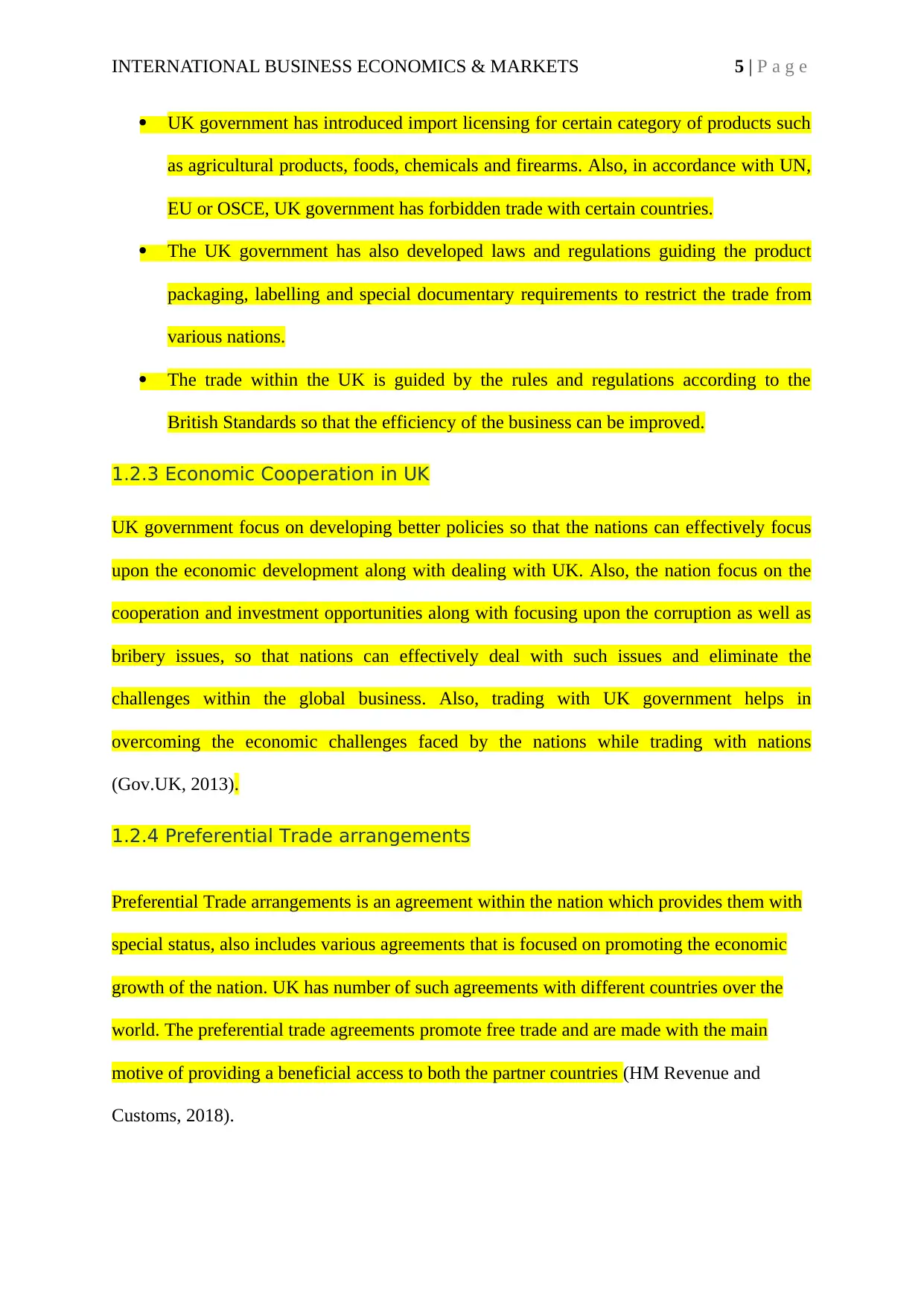
INTERNATIONAL BUSINESS ECONOMICS & MARKETS 5 | P a g e
UK government has introduced import licensing for certain category of products such
as agricultural products, foods, chemicals and firearms. Also, in accordance with UN,
EU or OSCE, UK government has forbidden trade with certain countries.
The UK government has also developed laws and regulations guiding the product
packaging, labelling and special documentary requirements to restrict the trade from
various nations.
The trade within the UK is guided by the rules and regulations according to the
British Standards so that the efficiency of the business can be improved.
1.2.3 Economic Cooperation in UK
UK government focus on developing better policies so that the nations can effectively focus
upon the economic development along with dealing with UK. Also, the nation focus on the
cooperation and investment opportunities along with focusing upon the corruption as well as
bribery issues, so that nations can effectively deal with such issues and eliminate the
challenges within the global business. Also, trading with UK government helps in
overcoming the economic challenges faced by the nations while trading with nations
(Gov.UK, 2013).
1.2.4 Preferential Trade arrangements
Preferential Trade arrangements is an agreement within the nation which provides them with
special status, also includes various agreements that is focused on promoting the economic
growth of the nation. UK has number of such agreements with different countries over the
world. The preferential trade agreements promote free trade and are made with the main
motive of providing a beneficial access to both the partner countries (HM Revenue and
Customs, 2018).
UK government has introduced import licensing for certain category of products such
as agricultural products, foods, chemicals and firearms. Also, in accordance with UN,
EU or OSCE, UK government has forbidden trade with certain countries.
The UK government has also developed laws and regulations guiding the product
packaging, labelling and special documentary requirements to restrict the trade from
various nations.
The trade within the UK is guided by the rules and regulations according to the
British Standards so that the efficiency of the business can be improved.
1.2.3 Economic Cooperation in UK
UK government focus on developing better policies so that the nations can effectively focus
upon the economic development along with dealing with UK. Also, the nation focus on the
cooperation and investment opportunities along with focusing upon the corruption as well as
bribery issues, so that nations can effectively deal with such issues and eliminate the
challenges within the global business. Also, trading with UK government helps in
overcoming the economic challenges faced by the nations while trading with nations
(Gov.UK, 2013).
1.2.4 Preferential Trade arrangements
Preferential Trade arrangements is an agreement within the nation which provides them with
special status, also includes various agreements that is focused on promoting the economic
growth of the nation. UK has number of such agreements with different countries over the
world. The preferential trade agreements promote free trade and are made with the main
motive of providing a beneficial access to both the partner countries (HM Revenue and
Customs, 2018).
⊘ This is a preview!⊘
Do you want full access?
Subscribe today to unlock all pages.

Trusted by 1+ million students worldwide
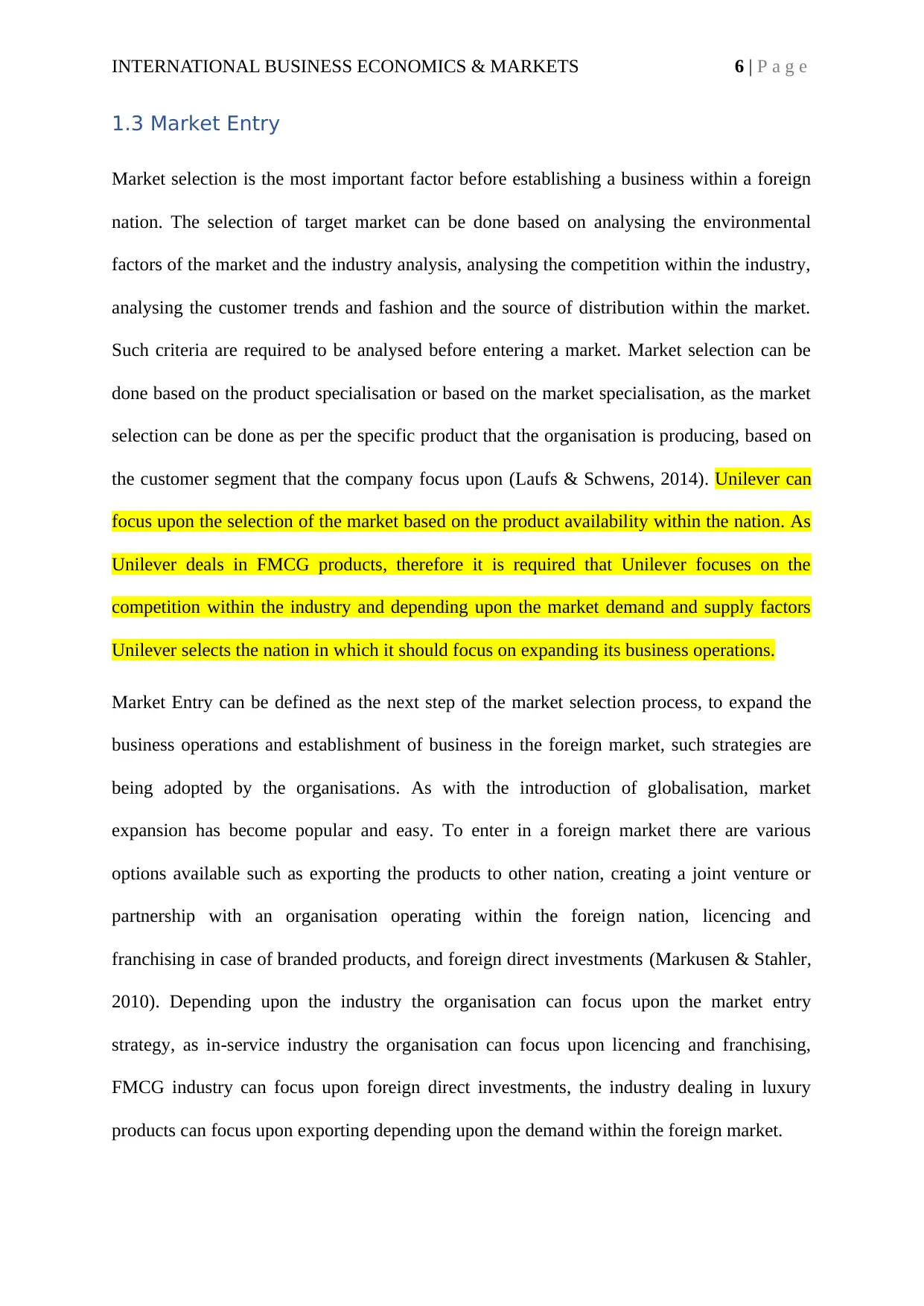
INTERNATIONAL BUSINESS ECONOMICS & MARKETS 6 | P a g e
1.3 Market Entry
Market selection is the most important factor before establishing a business within a foreign
nation. The selection of target market can be done based on analysing the environmental
factors of the market and the industry analysis, analysing the competition within the industry,
analysing the customer trends and fashion and the source of distribution within the market.
Such criteria are required to be analysed before entering a market. Market selection can be
done based on the product specialisation or based on the market specialisation, as the market
selection can be done as per the specific product that the organisation is producing, based on
the customer segment that the company focus upon (Laufs & Schwens, 2014). Unilever can
focus upon the selection of the market based on the product availability within the nation. As
Unilever deals in FMCG products, therefore it is required that Unilever focuses on the
competition within the industry and depending upon the market demand and supply factors
Unilever selects the nation in which it should focus on expanding its business operations.
Market Entry can be defined as the next step of the market selection process, to expand the
business operations and establishment of business in the foreign market, such strategies are
being adopted by the organisations. As with the introduction of globalisation, market
expansion has become popular and easy. To enter in a foreign market there are various
options available such as exporting the products to other nation, creating a joint venture or
partnership with an organisation operating within the foreign nation, licencing and
franchising in case of branded products, and foreign direct investments (Markusen & Stahler,
2010). Depending upon the industry the organisation can focus upon the market entry
strategy, as in-service industry the organisation can focus upon licencing and franchising,
FMCG industry can focus upon foreign direct investments, the industry dealing in luxury
products can focus upon exporting depending upon the demand within the foreign market.
1.3 Market Entry
Market selection is the most important factor before establishing a business within a foreign
nation. The selection of target market can be done based on analysing the environmental
factors of the market and the industry analysis, analysing the competition within the industry,
analysing the customer trends and fashion and the source of distribution within the market.
Such criteria are required to be analysed before entering a market. Market selection can be
done based on the product specialisation or based on the market specialisation, as the market
selection can be done as per the specific product that the organisation is producing, based on
the customer segment that the company focus upon (Laufs & Schwens, 2014). Unilever can
focus upon the selection of the market based on the product availability within the nation. As
Unilever deals in FMCG products, therefore it is required that Unilever focuses on the
competition within the industry and depending upon the market demand and supply factors
Unilever selects the nation in which it should focus on expanding its business operations.
Market Entry can be defined as the next step of the market selection process, to expand the
business operations and establishment of business in the foreign market, such strategies are
being adopted by the organisations. As with the introduction of globalisation, market
expansion has become popular and easy. To enter in a foreign market there are various
options available such as exporting the products to other nation, creating a joint venture or
partnership with an organisation operating within the foreign nation, licencing and
franchising in case of branded products, and foreign direct investments (Markusen & Stahler,
2010). Depending upon the industry the organisation can focus upon the market entry
strategy, as in-service industry the organisation can focus upon licencing and franchising,
FMCG industry can focus upon foreign direct investments, the industry dealing in luxury
products can focus upon exporting depending upon the demand within the foreign market.
Paraphrase This Document
Need a fresh take? Get an instant paraphrase of this document with our AI Paraphraser
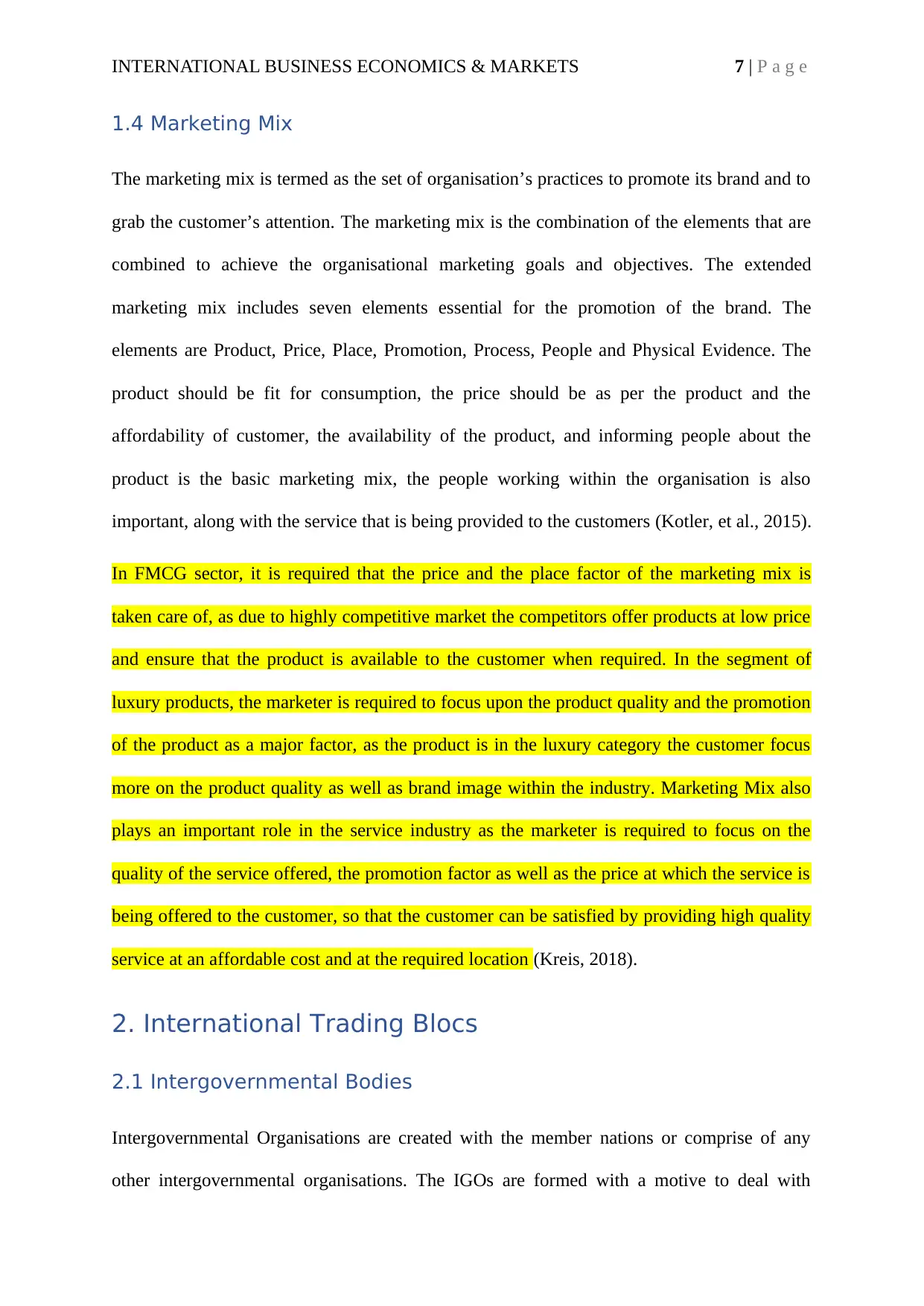
INTERNATIONAL BUSINESS ECONOMICS & MARKETS 7 | P a g e
1.4 Marketing Mix
The marketing mix is termed as the set of organisation’s practices to promote its brand and to
grab the customer’s attention. The marketing mix is the combination of the elements that are
combined to achieve the organisational marketing goals and objectives. The extended
marketing mix includes seven elements essential for the promotion of the brand. The
elements are Product, Price, Place, Promotion, Process, People and Physical Evidence. The
product should be fit for consumption, the price should be as per the product and the
affordability of customer, the availability of the product, and informing people about the
product is the basic marketing mix, the people working within the organisation is also
important, along with the service that is being provided to the customers (Kotler, et al., 2015).
In FMCG sector, it is required that the price and the place factor of the marketing mix is
taken care of, as due to highly competitive market the competitors offer products at low price
and ensure that the product is available to the customer when required. In the segment of
luxury products, the marketer is required to focus upon the product quality and the promotion
of the product as a major factor, as the product is in the luxury category the customer focus
more on the product quality as well as brand image within the industry. Marketing Mix also
plays an important role in the service industry as the marketer is required to focus on the
quality of the service offered, the promotion factor as well as the price at which the service is
being offered to the customer, so that the customer can be satisfied by providing high quality
service at an affordable cost and at the required location (Kreis, 2018).
2. International Trading Blocs
2.1 Intergovernmental Bodies
Intergovernmental Organisations are created with the member nations or comprise of any
other intergovernmental organisations. The IGOs are formed with a motive to deal with
1.4 Marketing Mix
The marketing mix is termed as the set of organisation’s practices to promote its brand and to
grab the customer’s attention. The marketing mix is the combination of the elements that are
combined to achieve the organisational marketing goals and objectives. The extended
marketing mix includes seven elements essential for the promotion of the brand. The
elements are Product, Price, Place, Promotion, Process, People and Physical Evidence. The
product should be fit for consumption, the price should be as per the product and the
affordability of customer, the availability of the product, and informing people about the
product is the basic marketing mix, the people working within the organisation is also
important, along with the service that is being provided to the customers (Kotler, et al., 2015).
In FMCG sector, it is required that the price and the place factor of the marketing mix is
taken care of, as due to highly competitive market the competitors offer products at low price
and ensure that the product is available to the customer when required. In the segment of
luxury products, the marketer is required to focus upon the product quality and the promotion
of the product as a major factor, as the product is in the luxury category the customer focus
more on the product quality as well as brand image within the industry. Marketing Mix also
plays an important role in the service industry as the marketer is required to focus on the
quality of the service offered, the promotion factor as well as the price at which the service is
being offered to the customer, so that the customer can be satisfied by providing high quality
service at an affordable cost and at the required location (Kreis, 2018).
2. International Trading Blocs
2.1 Intergovernmental Bodies
Intergovernmental Organisations are created with the member nations or comprise of any
other intergovernmental organisations. The IGOs are formed with a motive to deal with
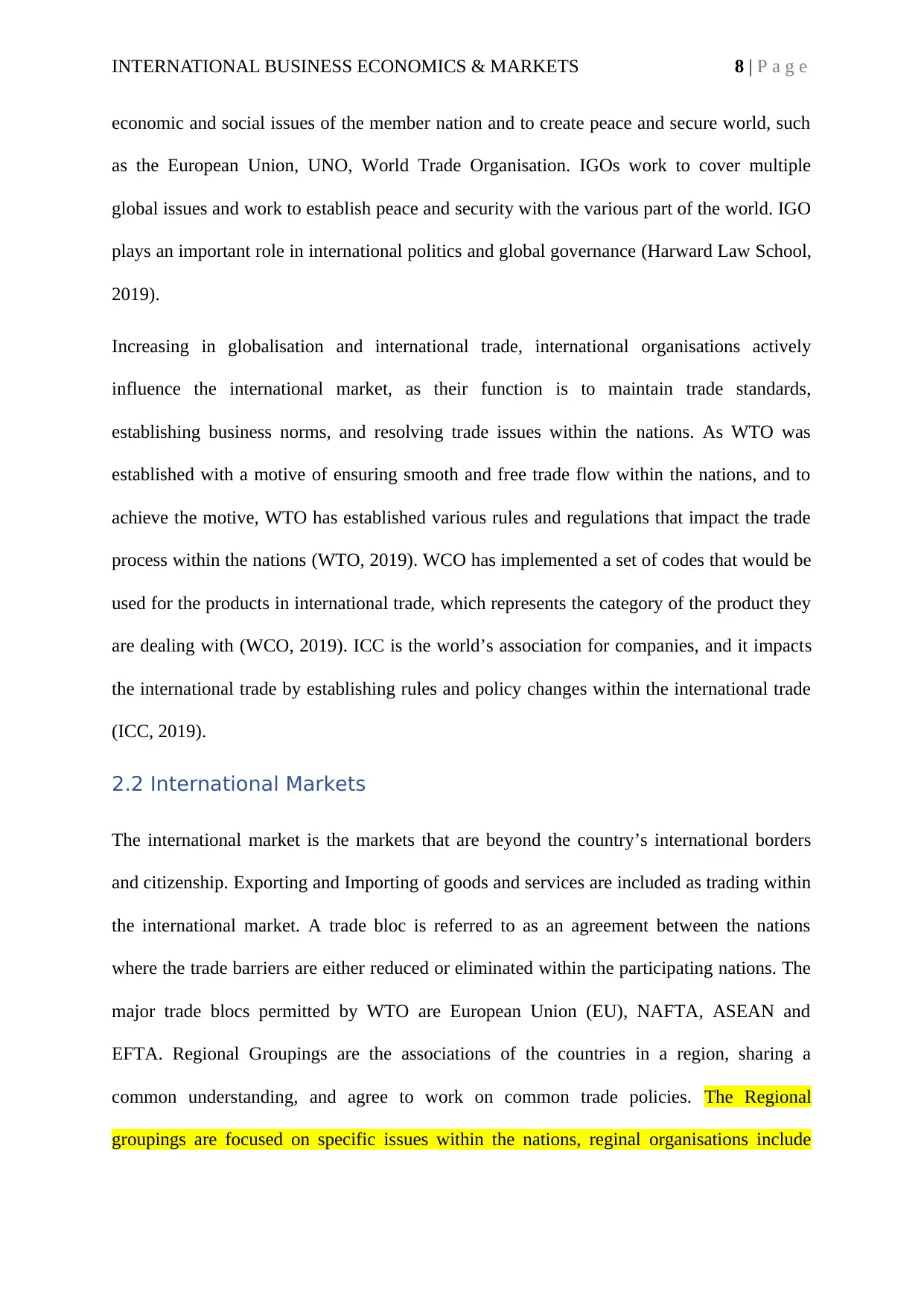
INTERNATIONAL BUSINESS ECONOMICS & MARKETS 8 | P a g e
economic and social issues of the member nation and to create peace and secure world, such
as the European Union, UNO, World Trade Organisation. IGOs work to cover multiple
global issues and work to establish peace and security with the various part of the world. IGO
plays an important role in international politics and global governance (Harward Law School,
2019).
Increasing in globalisation and international trade, international organisations actively
influence the international market, as their function is to maintain trade standards,
establishing business norms, and resolving trade issues within the nations. As WTO was
established with a motive of ensuring smooth and free trade flow within the nations, and to
achieve the motive, WTO has established various rules and regulations that impact the trade
process within the nations (WTO, 2019). WCO has implemented a set of codes that would be
used for the products in international trade, which represents the category of the product they
are dealing with (WCO, 2019). ICC is the world’s association for companies, and it impacts
the international trade by establishing rules and policy changes within the international trade
(ICC, 2019).
2.2 International Markets
The international market is the markets that are beyond the country’s international borders
and citizenship. Exporting and Importing of goods and services are included as trading within
the international market. A trade bloc is referred to as an agreement between the nations
where the trade barriers are either reduced or eliminated within the participating nations. The
major trade blocs permitted by WTO are European Union (EU), NAFTA, ASEAN and
EFTA. Regional Groupings are the associations of the countries in a region, sharing a
common understanding, and agree to work on common trade policies. The Regional
groupings are focused on specific issues within the nations, reginal organisations include
economic and social issues of the member nation and to create peace and secure world, such
as the European Union, UNO, World Trade Organisation. IGOs work to cover multiple
global issues and work to establish peace and security with the various part of the world. IGO
plays an important role in international politics and global governance (Harward Law School,
2019).
Increasing in globalisation and international trade, international organisations actively
influence the international market, as their function is to maintain trade standards,
establishing business norms, and resolving trade issues within the nations. As WTO was
established with a motive of ensuring smooth and free trade flow within the nations, and to
achieve the motive, WTO has established various rules and regulations that impact the trade
process within the nations (WTO, 2019). WCO has implemented a set of codes that would be
used for the products in international trade, which represents the category of the product they
are dealing with (WCO, 2019). ICC is the world’s association for companies, and it impacts
the international trade by establishing rules and policy changes within the international trade
(ICC, 2019).
2.2 International Markets
The international market is the markets that are beyond the country’s international borders
and citizenship. Exporting and Importing of goods and services are included as trading within
the international market. A trade bloc is referred to as an agreement between the nations
where the trade barriers are either reduced or eliminated within the participating nations. The
major trade blocs permitted by WTO are European Union (EU), NAFTA, ASEAN and
EFTA. Regional Groupings are the associations of the countries in a region, sharing a
common understanding, and agree to work on common trade policies. The Regional
groupings are focused on specific issues within the nations, reginal organisations include
⊘ This is a preview!⊘
Do you want full access?
Subscribe today to unlock all pages.

Trusted by 1+ million students worldwide
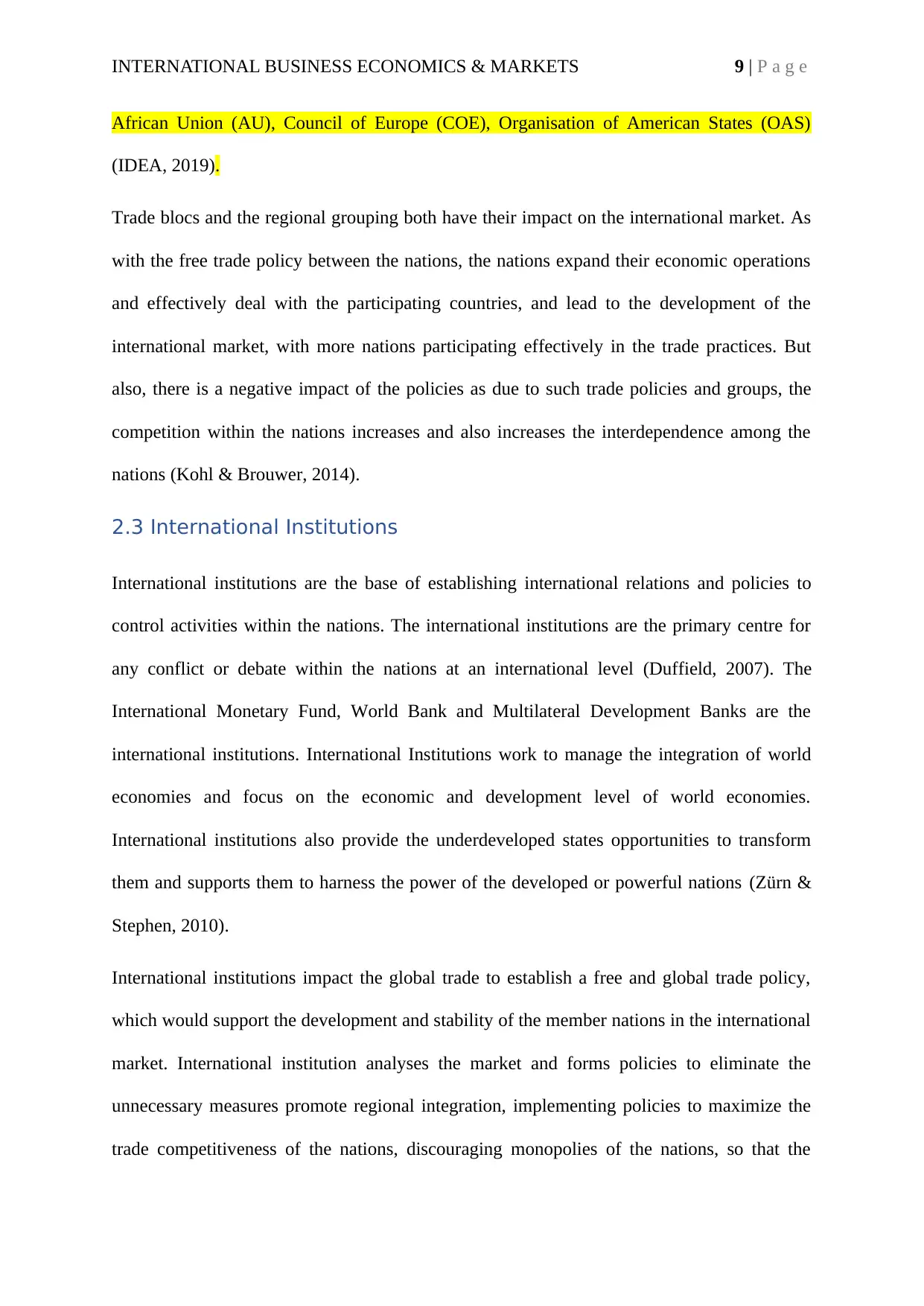
INTERNATIONAL BUSINESS ECONOMICS & MARKETS 9 | P a g e
African Union (AU), Council of Europe (COE), Organisation of American States (OAS)
(IDEA, 2019).
Trade blocs and the regional grouping both have their impact on the international market. As
with the free trade policy between the nations, the nations expand their economic operations
and effectively deal with the participating countries, and lead to the development of the
international market, with more nations participating effectively in the trade practices. But
also, there is a negative impact of the policies as due to such trade policies and groups, the
competition within the nations increases and also increases the interdependence among the
nations (Kohl & Brouwer, 2014).
2.3 International Institutions
International institutions are the base of establishing international relations and policies to
control activities within the nations. The international institutions are the primary centre for
any conflict or debate within the nations at an international level (Duffield, 2007). The
International Monetary Fund, World Bank and Multilateral Development Banks are the
international institutions. International Institutions work to manage the integration of world
economies and focus on the economic and development level of world economies.
International institutions also provide the underdeveloped states opportunities to transform
them and supports them to harness the power of the developed or powerful nations (Zürn &
Stephen, 2010).
International institutions impact the global trade to establish a free and global trade policy,
which would support the development and stability of the member nations in the international
market. International institution analyses the market and forms policies to eliminate the
unnecessary measures promote regional integration, implementing policies to maximize the
trade competitiveness of the nations, discouraging monopolies of the nations, so that the
African Union (AU), Council of Europe (COE), Organisation of American States (OAS)
(IDEA, 2019).
Trade blocs and the regional grouping both have their impact on the international market. As
with the free trade policy between the nations, the nations expand their economic operations
and effectively deal with the participating countries, and lead to the development of the
international market, with more nations participating effectively in the trade practices. But
also, there is a negative impact of the policies as due to such trade policies and groups, the
competition within the nations increases and also increases the interdependence among the
nations (Kohl & Brouwer, 2014).
2.3 International Institutions
International institutions are the base of establishing international relations and policies to
control activities within the nations. The international institutions are the primary centre for
any conflict or debate within the nations at an international level (Duffield, 2007). The
International Monetary Fund, World Bank and Multilateral Development Banks are the
international institutions. International Institutions work to manage the integration of world
economies and focus on the economic and development level of world economies.
International institutions also provide the underdeveloped states opportunities to transform
them and supports them to harness the power of the developed or powerful nations (Zürn &
Stephen, 2010).
International institutions impact the global trade to establish a free and global trade policy,
which would support the development and stability of the member nations in the international
market. International institution analyses the market and forms policies to eliminate the
unnecessary measures promote regional integration, implementing policies to maximize the
trade competitiveness of the nations, discouraging monopolies of the nations, so that the
Paraphrase This Document
Need a fresh take? Get an instant paraphrase of this document with our AI Paraphraser
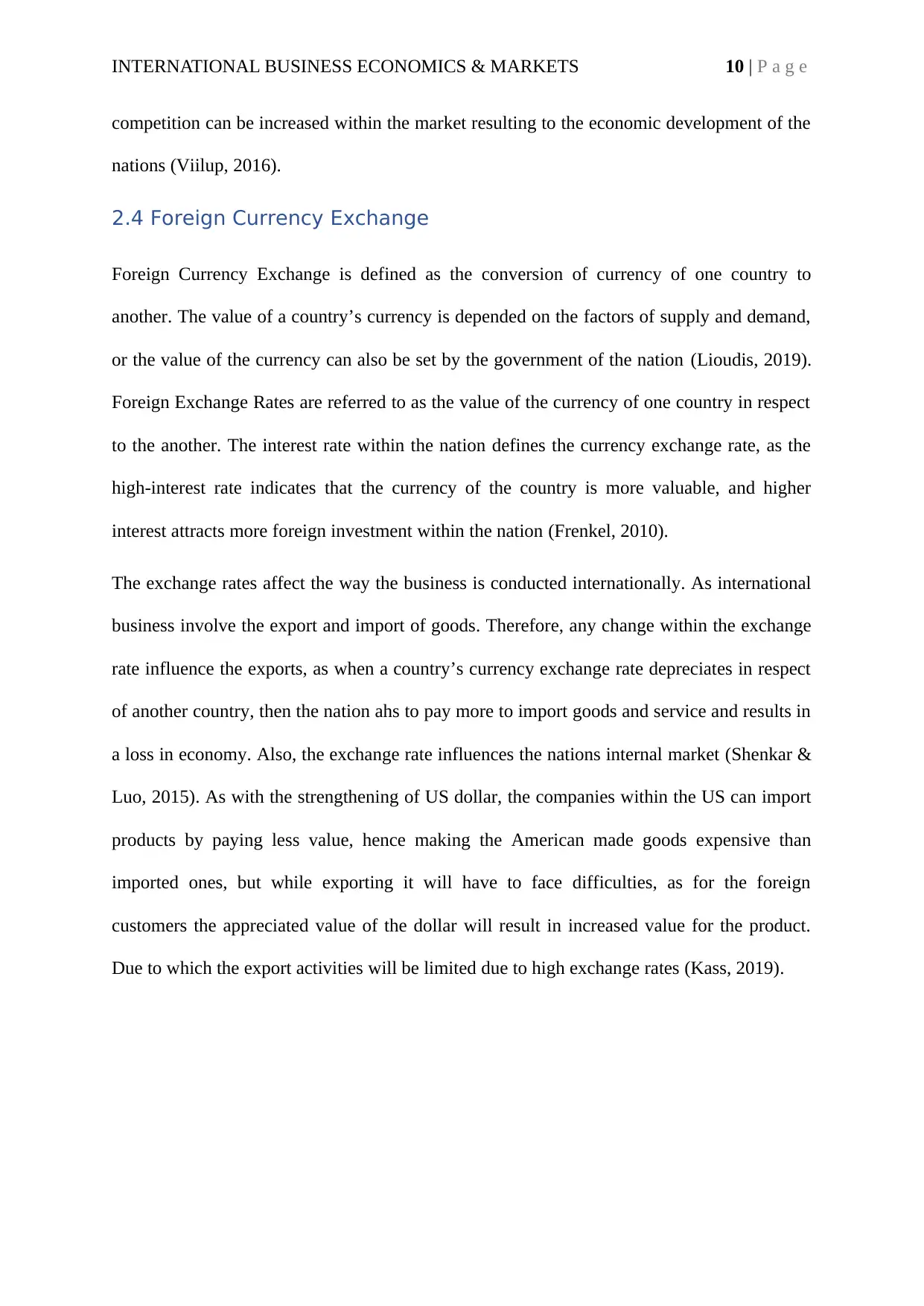
INTERNATIONAL BUSINESS ECONOMICS & MARKETS 10 | P a g e
competition can be increased within the market resulting to the economic development of the
nations (Viilup, 2016).
2.4 Foreign Currency Exchange
Foreign Currency Exchange is defined as the conversion of currency of one country to
another. The value of a country’s currency is depended on the factors of supply and demand,
or the value of the currency can also be set by the government of the nation (Lioudis, 2019).
Foreign Exchange Rates are referred to as the value of the currency of one country in respect
to the another. The interest rate within the nation defines the currency exchange rate, as the
high-interest rate indicates that the currency of the country is more valuable, and higher
interest attracts more foreign investment within the nation (Frenkel, 2010).
The exchange rates affect the way the business is conducted internationally. As international
business involve the export and import of goods. Therefore, any change within the exchange
rate influence the exports, as when a country’s currency exchange rate depreciates in respect
of another country, then the nation ahs to pay more to import goods and service and results in
a loss in economy. Also, the exchange rate influences the nations internal market (Shenkar &
Luo, 2015). As with the strengthening of US dollar, the companies within the US can import
products by paying less value, hence making the American made goods expensive than
imported ones, but while exporting it will have to face difficulties, as for the foreign
customers the appreciated value of the dollar will result in increased value for the product.
Due to which the export activities will be limited due to high exchange rates (Kass, 2019).
competition can be increased within the market resulting to the economic development of the
nations (Viilup, 2016).
2.4 Foreign Currency Exchange
Foreign Currency Exchange is defined as the conversion of currency of one country to
another. The value of a country’s currency is depended on the factors of supply and demand,
or the value of the currency can also be set by the government of the nation (Lioudis, 2019).
Foreign Exchange Rates are referred to as the value of the currency of one country in respect
to the another. The interest rate within the nation defines the currency exchange rate, as the
high-interest rate indicates that the currency of the country is more valuable, and higher
interest attracts more foreign investment within the nation (Frenkel, 2010).
The exchange rates affect the way the business is conducted internationally. As international
business involve the export and import of goods. Therefore, any change within the exchange
rate influence the exports, as when a country’s currency exchange rate depreciates in respect
of another country, then the nation ahs to pay more to import goods and service and results in
a loss in economy. Also, the exchange rate influences the nations internal market (Shenkar &
Luo, 2015). As with the strengthening of US dollar, the companies within the US can import
products by paying less value, hence making the American made goods expensive than
imported ones, but while exporting it will have to face difficulties, as for the foreign
customers the appreciated value of the dollar will result in increased value for the product.
Due to which the export activities will be limited due to high exchange rates (Kass, 2019).
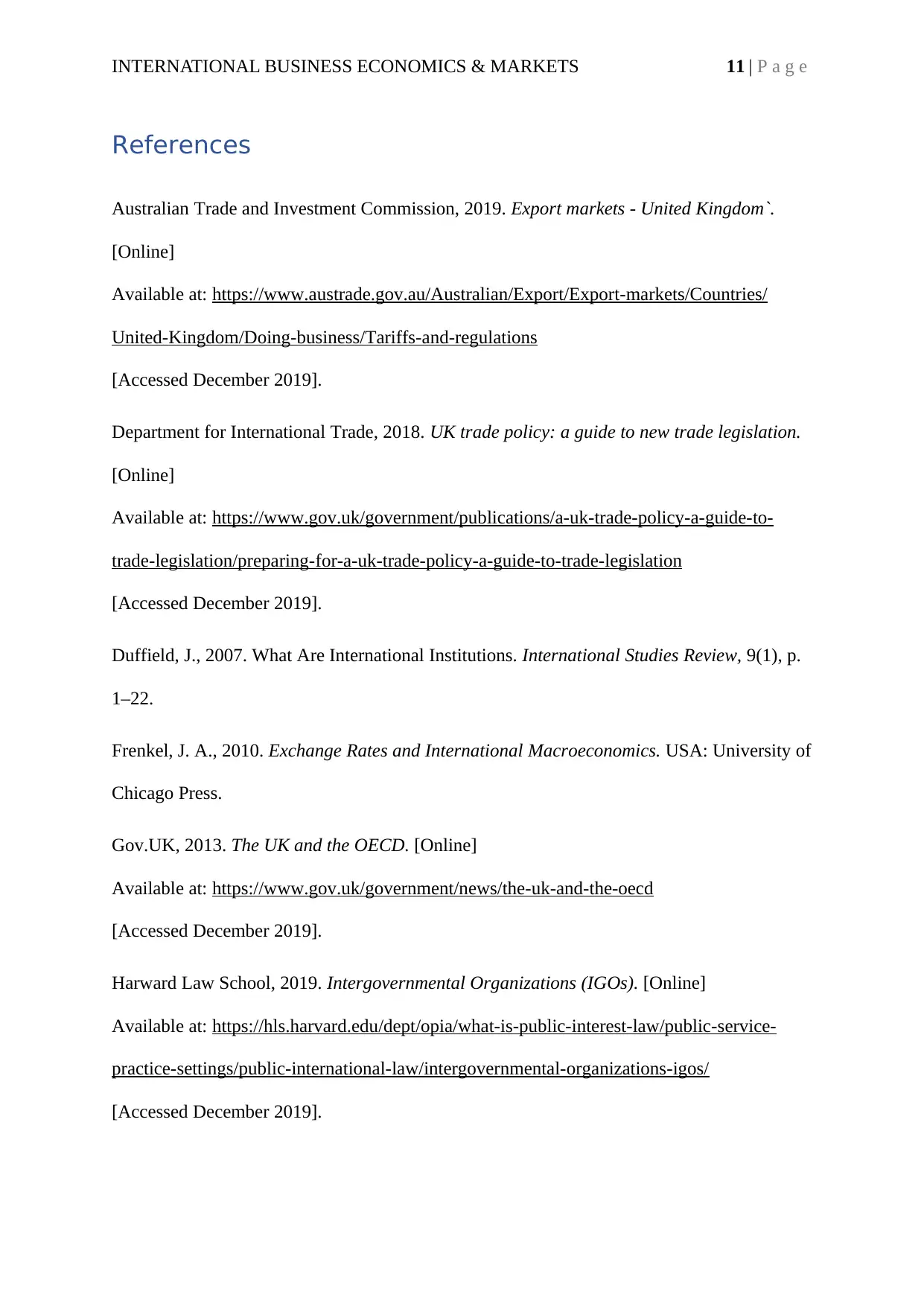
INTERNATIONAL BUSINESS ECONOMICS & MARKETS 11 | P a g e
References
Australian Trade and Investment Commission, 2019. Export markets - United Kingdom`.
[Online]
Available at: https://www.austrade.gov.au/Australian/Export/Export-markets/Countries/
United-Kingdom/Doing-business/Tariffs-and-regulations
[Accessed December 2019].
Department for International Trade, 2018. UK trade policy: a guide to new trade legislation.
[Online]
Available at: https://www.gov.uk/government/publications/a-uk-trade-policy-a-guide-to-
trade-legislation/preparing-for-a-uk-trade-policy-a-guide-to-trade-legislation
[Accessed December 2019].
Duffield, J., 2007. What Are International Institutions. International Studies Review, 9(1), p.
1–22.
Frenkel, J. A., 2010. Exchange Rates and International Macroeconomics. USA: University of
Chicago Press.
Gov.UK, 2013. The UK and the OECD. [Online]
Available at: https://www.gov.uk/government/news/the-uk-and-the-oecd
[Accessed December 2019].
Harward Law School, 2019. Intergovernmental Organizations (IGOs). [Online]
Available at: https://hls.harvard.edu/dept/opia/what-is-public-interest-law/public-service-
practice-settings/public-international-law/intergovernmental-organizations-igos/
[Accessed December 2019].
References
Australian Trade and Investment Commission, 2019. Export markets - United Kingdom`.
[Online]
Available at: https://www.austrade.gov.au/Australian/Export/Export-markets/Countries/
United-Kingdom/Doing-business/Tariffs-and-regulations
[Accessed December 2019].
Department for International Trade, 2018. UK trade policy: a guide to new trade legislation.
[Online]
Available at: https://www.gov.uk/government/publications/a-uk-trade-policy-a-guide-to-
trade-legislation/preparing-for-a-uk-trade-policy-a-guide-to-trade-legislation
[Accessed December 2019].
Duffield, J., 2007. What Are International Institutions. International Studies Review, 9(1), p.
1–22.
Frenkel, J. A., 2010. Exchange Rates and International Macroeconomics. USA: University of
Chicago Press.
Gov.UK, 2013. The UK and the OECD. [Online]
Available at: https://www.gov.uk/government/news/the-uk-and-the-oecd
[Accessed December 2019].
Harward Law School, 2019. Intergovernmental Organizations (IGOs). [Online]
Available at: https://hls.harvard.edu/dept/opia/what-is-public-interest-law/public-service-
practice-settings/public-international-law/intergovernmental-organizations-igos/
[Accessed December 2019].
⊘ This is a preview!⊘
Do you want full access?
Subscribe today to unlock all pages.

Trusted by 1+ million students worldwide
1 out of 15
Related Documents
Your All-in-One AI-Powered Toolkit for Academic Success.
+13062052269
info@desklib.com
Available 24*7 on WhatsApp / Email
![[object Object]](/_next/static/media/star-bottom.7253800d.svg)
Unlock your academic potential
Copyright © 2020–2026 A2Z Services. All Rights Reserved. Developed and managed by ZUCOL.



